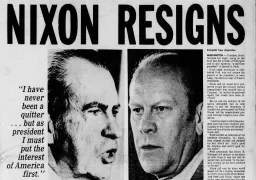President Johnson Signs Civil Rights Act
The Civil Rights Act was signed into law by President Lyndon B. Johnson on July 2, 1964, representing a watershed moment in the struggle for racial equality in the United States. This comprehensive legislation outlawed discrimination based on race, color, religion, sex, or national origin, ended segregation in public places, and banned employment discrimination. It […]
The KKK Kills Three Civil Rights Activists
On the night of June 21, 1964, three civil rights activists, James Chaney, Andrew Goodman, and Michael Schwerner, were abducted and murdered by members of the Ku Klux Klan near Philadelphia, Mississippi. These young men were participating in the Freedom Summer campaign aimed at registering African American voters in the South. Their tragic deaths highlighted […]
The Ford Mustang Makes its Grand Debut
The Ford Mustang, a symbol of American automotive innovation, made its grand debut at the New York World’s Fair on April 17, 1964. This sleek and affordable sports car captured the hearts of Americans, revolutionizing the auto industry and becoming an instant classic. Its introduction not only spawned a new class of vehicles, the “pony […]
Earthquake Devastates Alaska
A devastating earthquake, known as the Great Alaska Earthquake, strikes the state with a magnitude of 9.2, triggering landslides, tsunamis, and widespread destruction across the region. This seismic event remains one of the most powerful earthquakes ever recorded in North American history, reshaping the landscape and prompting advancements in earthquake preparedness and engineering.
Italian Government Seeks Solutions for Leaning Tower of Pisa
On February 27, 1964, the Italian government initiated a call for suggestions to address the structural issues of the iconic Leaning Tower of Pisa. Engineers and experts worldwide were invited to propose innovative solutions to stabilize and preserve this historical landmark.
The Beatles Perform on The Ed Sullivan Show
A historic moment in music and television took place on February 9th, 1964, as The Beatles made their iconic debut on The Ed Sullivan Show, captivating audiences across America and igniting “Beatlemania.”
The Beatles Arrive in the United States, Igniting “Beatlemania”
On February 7th, 1964, the Beatles, the iconic British rock band, arrived in the United States for the first time, sparking a cultural phenomenon known as “Beatlemania” and forever changing the landscape of popular music.
The 24th Amendment to the U.S. Constitution is Ratified, Abolishing Poll Taxes
On this day in 1964, the 24th Amendment to the U.S. Constitution was ratified, prohibiting the imposition of poll taxes in federal elections. This was a significant step in advancing voting rights.
Sartre Wins and Declines Nobel Prize
Jean-Paul Sartre won and then declined the Nobel Prize for Literature. He regretted that it gave the appearance of scandal, but declined because he felt that accepting the award would limit his reach and influence as a writer.
China’s Atomic Bomb

China exploded an atomic bomb at 15:00 hours on October 16, 1964, thereby successfully carrying out its first nuclear test. This is a major achievement of the Chinese people in their struggle to strengthen their national defence and oppose the U.S. imperialist policy of nuclear blackmail and nuclear threats.
